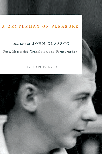There are ways in which biographies, interesting ones at any rate, act as reference points; for better or worse, they turn a life (whether typical or atypical) into a marker for a particular historical moment, or use it to summarize events too complex for readers to grasp in other ways. Though this is not their only effect, it is a compelling one.
Certainly, the notion of reference points came to mind while reading Brian Busby’s engaging life of John Glassco, A Gentleman of Pleasure: One Life of John Glassco Poet, Memoirist,Translator, and Pornographer. Glassco is best remembered for his Memoirs of Montparnasse, a chronicle of his years as part of the expat literary milieu in 1920s Paris. His most successful title, it became a bestseller and earned high praise; the Financial Post called it a “masterpiece” and Malcolm Cowley characterized it as “fresher and truer to the moment” than even Hemingway’s version(s). It was not long, however, before Memoirs’ veracity came under attack by many, including such prominent critics as Louis Dudek. Similar doubts about truthfulness attached themselves to other books by Glassco. Happily, Busby’s biography is meticulously researched and catches many questionable details and variant accounts of events while never losing sight of the overarching structure of his subject’s project as an author.That’s no small strength when the project includes much playful self-mythologizing, because, however charming Glassco’s delight in fabulation and light touch with mere fact may be, it complicates things for biographers.

A Gentleman Of Pleasure: One Life Of John Glassco Poet, Memoirist, Translator, And Pornographer
Brian Busby
McGill-Queen's University Press
$39.95
hardcover
408pp
9780773538184
That said, the idea of “reference points” has a flip side; it evokes the question of the canon, which haunts this book like a ghost. Given the range and strength of some of Glassco’s work, the degree of official recognition it received during his lifetime, his privileged background, and the period in which he was active (one in which the very idea of
CanLit was cobbled together), why is it not more solidly ensconced on Parnassus with the work of such friends as Atwood or F. R. Scott? Although playing games with the truth (however amusing) is a factor in his being overlooked, there must be more to it than that; Glassco’s choice to write pornography is surely central to his imperfect canonization. Most of the man’s prose fiction dealt with such specialized interests as rubber fetishism and flagellation and was given titles like Fetish Girl or The Fatal Woman which, even in our own day, would disincline many to being seen reading it in the metro.The effect decades ago must have been significantly greater. Moreover, fabulation as a strategy, however problematic, can be safely inscribed in a rich literary tradition (writers have flirted with the fiction/non-fiction divide as far back as Defoe) and provides career-advancing fodder for academic researchers.The polite attention that erotica has begun to receive among cultural theorists notwithstanding, taboo still clings to sexually explicit writing. Indeed, with the exception of Sade, Bataille, and a handful of Modernists, there are relatively few porn writers accorded serious and sustained critical attention.And if the situation is somewhat better for queer writers and queer theorists, how could it be otherwise given how sexuality is at the heart of such identities and the cultures arising from them tend to reflect this?
Caveats aside, the space in the canon where one should find books intended to arouse both mind and genitals is still overwhelmingly blank. One must ask: if literature is meant, as some might argue, to reflect human life in all its complexity, why is it that of all our activities, sex alone is so rigorously excluded? If books are meant to move, provoke, and stimulate us, why is the stirring of sexual feeling marginalized? Of course, there are no simple answers to such questions, nor am I prepared to hazard any guesses of my own (particularly in a brief review essay), but at a moment in which much of literary culture is radically transforming, perhaps a glance at other basic assumptions is in order. Surely these questions matter? And equally surely, Busby’s fine treatment of Glassco’s complex, artful, and provocative body of work gives us an excellent opportunity to
ask them. mRb







0 Comments